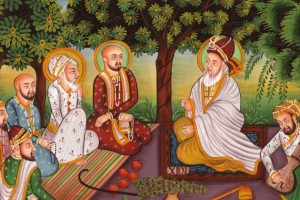
We all have heard and known Akbar as one of the great Mughal Emperors who ruled the Indian territories in the 16th-17th centuries. He was a one-of-a-kind sovereign who is known for many transformations within the Mughal Empire. The various developments introduced by him were in the sphere of polity and administration, society, economy, and precisely so in the religious realm. It would not be too far-fetched if we bestow him with the credit of starting a new religion based on absolute peace.
Several historians and scholars have analysed various religious policies of Akbar. His reign is also popularly known for the Ibadatkhana debates. One of the most important policies is of the sulh-i-kul. The concept has been translated by many as absolute peace. In its definition, it is the elimination of friction and the creation of absolute harmony—between man and man, man and God, as well as man and nature. It conceptualised a similar harmony on earth that exists in the cosmic order. It meant to facilitate the essential mystical framework within which the peaceful co-existence of diverse ethnic and religious entities or communities could be made possible.
Doesn’t this sound familiar with what the youth and the new generation across cultures have been talking and discussing in various forums? Doesn’t it seem to be a more humanitarian and a viable alternative? Does it ring-a-bell with the modern term atheism in its broader understanding? These are some of the questions we ponder upon from our day-to-day lives.
The various dictionaries define atheism in its broadest sense as disbelief or lack of belief in the existence of God or gods. According to our neo-understanding of secularism and religion, the concept of atheism is a trending one. However, it is a package deal, as it has a lot of criticism and controversy attached to it. Those who have not familiarised themselves with the concept of atheism have often fallen prey to voices which say that it is one’s’ hatred towards God or gods. One also needs to understand that atheism does not refer to disrespecting the religious thought systems of others either.
These often led to communal tensions amongst communities. We can also find instances from the Hindu Vedic corpus supporting a rudimentary form of atheism. For example, the Mimamsas argued that there was no need to postulate a maker for the world, just as there was no need for an author to compose the Vedas or a God to validate the rituals. We can also find support for this understanding from Carvaka and Sankhya philosophies as well as in Buddhism and Jainism. Instances like these indicate that there were existing dissenting views within the various schools of Hindu philosophy and texts.
If our glorious-ancient texts like Mimansas can have an opinion ahead of its time, then why can’t we have one, living in the 21st century! If we look closely at the concept of sulh-i-kul and atheism hand-in-hand, we can observe that they are not different after all. Broadly, in their functionality and message, they prioritise peaceful existence and humanitarianism as their goal. They emphasise on a spiritually illuminated heart and the claws of rationality. A balanced combination of both elements will make an individual a human in its essence.
Apart from our ancient texts, we can also locate evidence of association of atheism back to the nineteenth century. For instance, several atheists, rationalists, and humanist associations in India emerged in the nineteenth century in interaction with similar British organisations. This might have also contributed towards the current societal inclination towards atheism.

Observing the concept with a deeper understanding, we can also infer that these two factors are also the key in current global-cultural forums where we are discussing the global future as one community and not as an individual community. The contemporary Indian society surcharged with confrontations, conflicts and religious intolerance that an alternative like atheism is most welcome.
We can also view the phenomenon as a growing need to demarcate ones’ religious boundaries and that what falls outside of this is godless or an atheist. However, we can also propose a sunny side to it. For instance, it also protects people from falling prey to fraudulent experiences due to ones’ extreme religiosity or religious blinded-ness. As it not only works on our system of thought but our mind is also involved. In a way, it also accounts humans and individuals responsible for ones’ acts and deeds rather than just blaming and complaining all of it on the almighty.
A comprehensive understanding of a concept which is complex is often inconclusive. As familiarity with the idea of being religious is often difficult, at the same time, being godless implies an equally unsettling endeavor for some. Most people dwell somewhere in between total immersion and the unequivocal rejection of religion, which can be a viable option.
There is no wrong or right when we discuss the system of thoughts and beliefs or religious traditions. It is more of a choice that is subjective and cannot be forced over others for our sakes. We are living in a progressive society, so let us meet halfway where we can co-exist harmoniously with our fellow atheists.
*This article does not mean to preach or propagate or demean any religion or religious community. It is something to think about, moving away from the conventional.
Ritika is a museum enthusiast and likes to explore the diverse arts, culture and heritage of India. Living in a country which has been the storehouse of history in its every nook and crannies, it becomes really difficult for her to remain aloof from it for long. She believes that the community needs to know about this and this is what she is striving to achieve.


